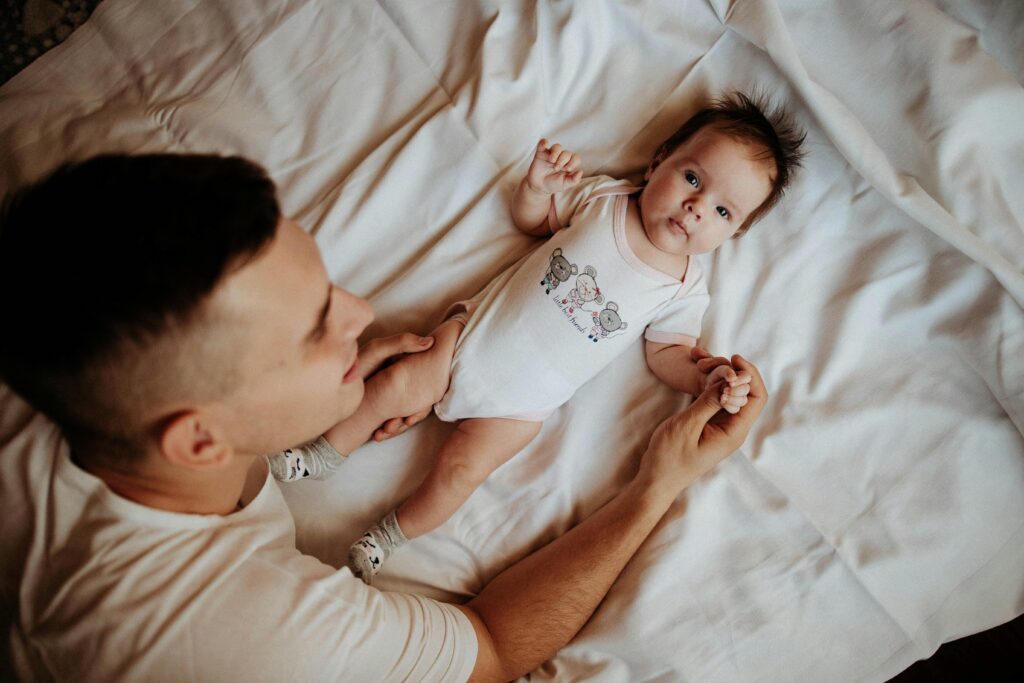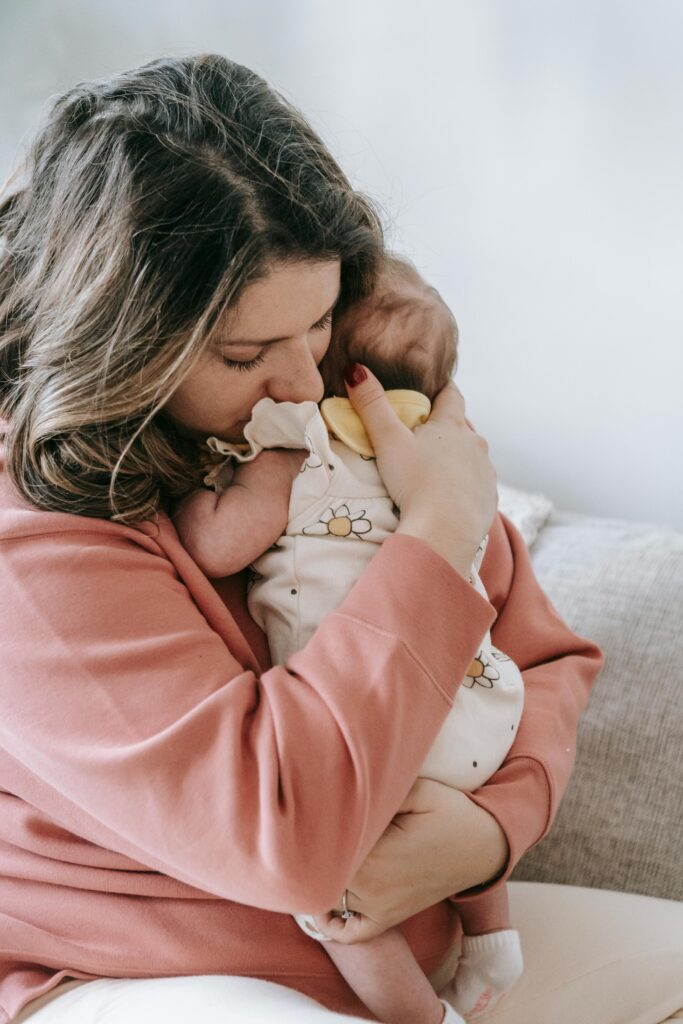
1. Understanding Your Baby’s Needs

Bringing home a newborn is exciting—but also a little overwhelming. If you’re wondering how to take care of your baby in those early weeks, don’t worry. Here’s a simple guide to help you through the basics.
Feeding
Newborns need to be fed every 2 to 3 hours. Breastfeeding provides the best nutrition and helps build your baby’s immune system. But if breastfeeding isn’t an option, formula is a safe and healthy choice too. What matters most is that your baby is fed and happy—fed is best.
Sleeping
Babies sleep a lot in the beginning—around 14 to 17 hours a day. Their sleep won’t follow a schedule at first, so don’t stress. Over time, your baby will naturally start to sleep longer at night.
Bathing and Hygiene
Until the umbilical cord falls off, give your baby a gentle sponge bath. After that, bathing 2 to 3 times a week is enough. Change diapers often and clean your baby gently to prevent diaper rash.
Bonding and Comfort
Your touch means everything. Skin-to-skin contact, cuddling, and soft music can help your baby feel safe. If they’re fussy, try swaddling, rocking, or gently bouncing them.
Baby Cues
Your baby can’t talk yet, but they’ll show you how they feel. Crying, sucking on hands, or turning their head can mean they’re hungry, sleepy, or just need a cuddle.
Doctor Visits and Milestones
Regular checkups help track your baby’s growth and give vaccines to protect them. Early milestones like smiling or lifting their head are exciting—but remember, every baby grows at their own pace.
2. Creating a Safe Environment

Sleep Safety
Always lay your baby on their back to sleep. This helps reduce the risk of SIDS (Sudden Infant Death Syndrome). Use a crib with a firm mattress and avoid pillows, stuffed animals, or loose blankets. These items can cause suffocation. Instead, use a sleep sack or wearable blanket. Keep your baby’s crib or bassinet in your room for at least the first 6 months—it makes night-time feeding easier and is safer.
Baby-Proofing Your Home
Your home may seem safe, but things that seem small to us can be dangerous for babies. Get down to your baby’s level and look around for sharp corners, cords, small objects, or anything that can be pulled or swallowed. Set up a soft, clean space for tummy time and early play. Even with baby-proofing, always supervise your baby closely.
Be Ready for Emergencies
It’s important to have a baby-friendly first-aid kit at home. Include items like baby-safe fever medicine, a thermometer, and bandages. Also, learn infant CPR—many hospitals and online sites offer easy classes for parents. Keep emergency numbers in a place that’s easy to find, like on the fridge.
Choose Safe Baby Products
Use baby gear like car seats, strollers, and carriers from trusted brands. Always check for product recalls. Pick toys made just for newborns—soft, chew-safe, and without small parts. When cleaning, use fragrance-free and gentle products. Keep all chemicals and cleaners locked away.
3. Feeding Your Baby

Feeding your baby is one of the most important parts of early parenting. Whether you choose to breastfeed or use formula, or are getting ready to start solids, here are some basics to help you feel confident.
Breastfeeding Basics
A good latch is the key to comfortable and effective breastfeeding. It shouldn’t hurt—if it does, your baby might not be latched on correctly. Don’t be afraid to ask a nurse or lactation consultant for help. Watch your baby for signs of hunger like turning their head (rooting), sucking on their hands, or becoming fussy. These signs usually come before crying.
Formula Feeding Tips
If you’re using formula, there are different types for different babies. Some are made for sensitive stomachs or allergies. Talk to your doctor to find the right one for your baby. Always read the label and follow instructions carefully when mixing it. Use clean, sterilized bottles, and store the formula safely.
When to Start Solids
Most babies are ready for solids around 6 months old. Signs they’re ready include being able to sit up with help, holding their head steady, and showing interest in food (like watching you eat or reaching for your food). Start with simple, soft foods like rice cereal, mashed bananas, or cooked carrots. Try one new food at a time, waiting a few days before offering another, so you can watch for allergies.
4. Building Daily Routines

Why Routines Matter
Babies feel more secure when their days have a rhythm. A regular flow of feeding, sleeping, and play helps them learn what to expect, which can make them calmer and happier.
Feeding, Napping, and Play
Start with a simple routine: feed your baby, then have a little playtime, and follow it with a nap. Playtime can be as easy as singing a song, gently talking, or showing them a colorful toy. Look into their eyes, smile, and respond to their sounds—this builds trust and helps them learn.
Bedtime Routine Tips
A peaceful bedtime routine makes it easier for babies to fall asleep. Try giving your baby a warm bath, followed by a lullaby or a short story. Keep the lights low and the mood calm. Doing the same steps each night helps your baby understand that it’s time to sleep.
Handling Night Feedings
Waking up at night is normal for newborns—they need to eat often. If you have a partner, take turns getting up. Try to keep the lights dim and avoid loud noises. Rest during the day when your baby naps, even if it’s just for a little while.
Be Flexible as Baby Grows
Your baby’s routine will change as they grow. Teething, growth spurts, or new skills like rolling over can affect sleep and feeding. That’s okay! Stay flexible and adjust the routine to match your baby’s needs.
5. Getting Help and Support

Support System for New Parents
Taking care of a baby is a big job, and you don’t have to do it alone. It’s okay to ask for help from your family and friends. Even a short break—like having someone hold the baby while you rest or take a shower—can help you feel better. If someone offers to help with cooking, cleaning, or errands, say yes! These small things can give you more time to care for your baby and yourself.
Connect with Other Parents
Being a new parent can sometimes feel lonely. Try joining a local or online parenting group. You can share your experiences, ask questions, and learn from others. Hearing that someone else is going through the same things can be comforting. Other parents can also give great tips and emotional support.
Use Helpful Resources
There are many books, websites, and parenting classes that can guide you through this new journey. Look for trusted sources, like children’s hospitals or well-known parenting experts. And remember—your baby’s doctor (pediatrician) is a great person to talk to. No question is too small when it comes to your child’s health and care.
Take Care of Yourself Too
It’s normal to feel tired, stressed, or overwhelmed. Your well-being matters too. Try to take a little time each day just for yourself—even if it’s just a short walk, a quiet cup of tea, or a power nap. You’re doing an important job, and it’s okay to need support. Don’t be afraid to reach out. Taking care of yourself helps you take better care of your baby.
Final Thoughts: You’ve Got This!

Taking care of a newborn means meeting their basic needs, keeping them safe, and giving them love and comfort. Routines help, but flexibility is just as important. Every baby is unique, and so is your parenting journey.
You won’t get everything perfect—and that’s okay. Trust your instincts, ask for help when you need it, and enjoy the little moments. You’re doing a great job!



